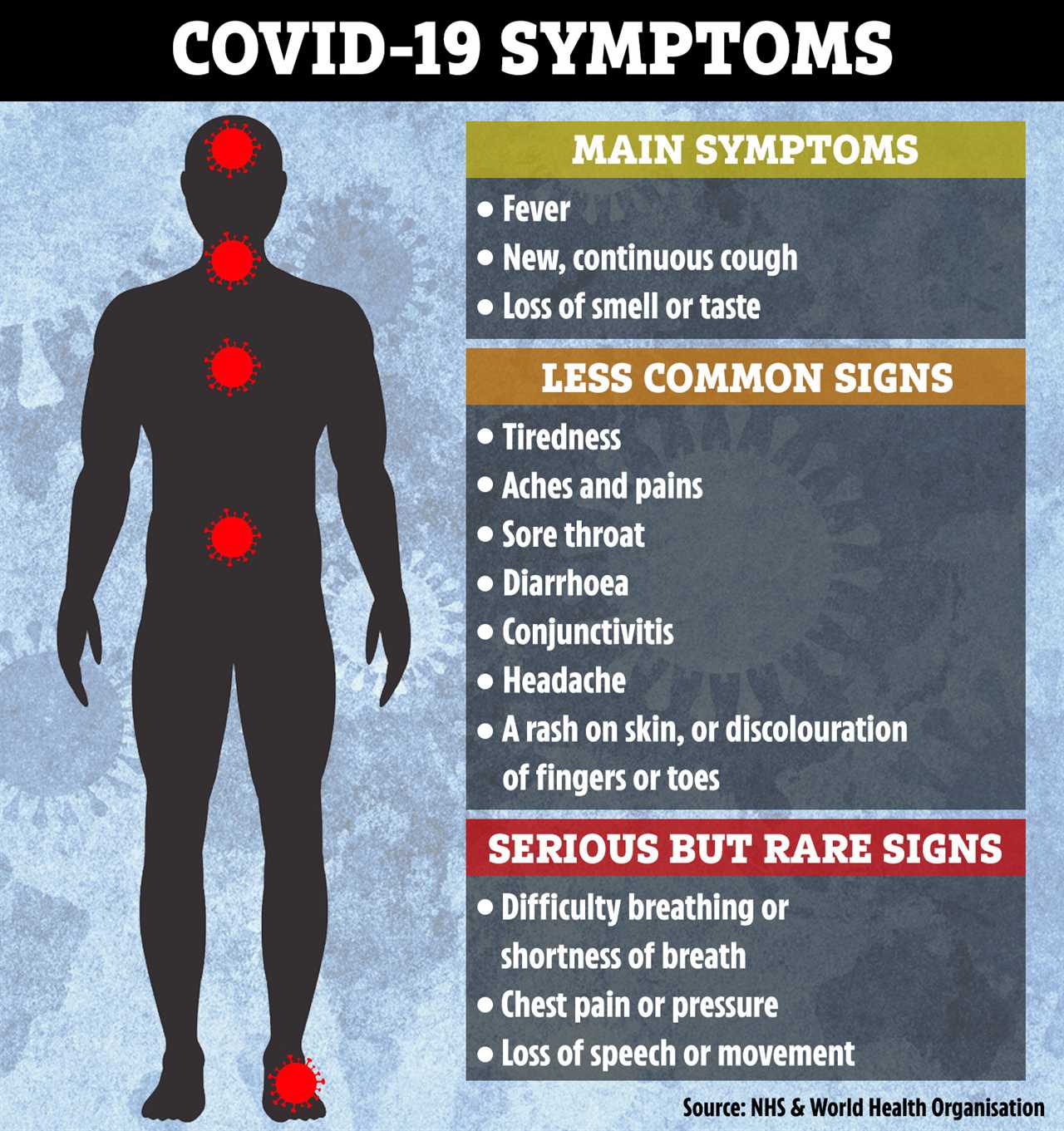A NEW variant of the coronavirus is ripping through the UK after it was first found in the South of England.
Experts have warned the variant is 70 per cent more infectious and as the country continues to battle with a rise in coronavirus infections it’s important to know the official symptoms of Covid-19.

One of the key symptoms of the coronavirus is a new persistent cough
These include a new persistent cough, a loss of taste and smell and a high temperature.
Mutations are normal in viruses like Covid-19, but some have questioned if vaccine efforts could be dampened by the new strain.
But the worries haven’t stopped the roll out of the new Oxford/AstraZeneca vaccine which has started to be administered across the UK today.
The most vulnerable in society will now either receive the Oxford offering or the Pfizer/BioNTech jab, which was rolled out in December.
Chief Medical Officer, Professor Chris Whitty said that symptoms of the new strain aren’t any different to the strain already circulating across the whole country.
A second strain has also been found in South Africa which Health Secretary Matt Hancock has said is “more transmissible” that other variants.
Scientists agree that the virus affects different people in various ways and what has become clearer as the pandemic has unfolded are the signs to look out for.
The NHS lists the three main coronavirus symptoms as:
- A new, continuous cough – where you cough a lot for more than an hour, or have three or more coughing episodes in 24 hours
- Fever – where your temperature is above 37.8C
- Loss of smell or taste – this is also known as anosmia
According to the World Health Organisation (WHO), tiredness is also one of the more common symptoms of Covid-19.
The WHO lists the less common symptoms as:
- Aches and pains
- Sore throat
- Diarrhoea
- Conjunctivitis
- Headache
- A rash on skin, or discolouration of fingers or toes

It can take around five or six days from when someone is infected with the virus for symptoms to show, however in some cases it can take up to two weeks.
Some people who catch the coronavirus may also be asymptomatic – this means that they don’t show any of the main symptoms.
Health Secretary Matt Hancock today revealed that more restrictions could be put into place in England to control the spread of the virus, which is being fuelled by the new variant.
Mr Hancock admitted that another national lockdown could be introduced, and hinted that more areas could move from Tier 3 restrictions – to the toughest Tier 4 measures.

He said the government “isn’t ruling anything out” when it comes to introducing new measures and said they won’t shy away from bringing in new restrictions if they are needed to save lives.
Speaking on Sky News this morning he said everyone should act as though they have the virus.
“We have shown that we can move incredibly quickly – within 24 hours if that’s necessary. We keep these things under review all the time.
“We look at the data on a daily basis – we can see there are significant rises.”
KIDS ARE ALRIGHT
While the above symptoms are the most common – other people have experienced a range of other symptoms and they are differ in children.
Prof Whitty said while the symptoms of the new strain are thought to be the same as others.
Dr Damien Rowland, consultant and honorary associate professor in paediatric emergency medicine at The University of Leicester today said whatever is happening with the virus in terms of new variants – it isn’t making a difference to kids.
Dr Julian Tang, Honorary Associate Professor/Clinical Virologist, University of Leicester said the spread of the new strain could be down to many reasons.
He added: “This is quite normal for viruses – like influenza – where different viruses may infect the same person, leading to a hybrid virus emerging. This is just one of the ways that natural viral variation arises.
“It makes no sense for the virus to kill its host – rather better for it to replicate to high levels in the host, causing few symptoms – so that the host can stay mobile and appear well (asymptomatic) – to allow it to mingle further with those who are still susceptible – and spread its genes further.”
The virus develops differently in people and there are others symptoms that people have displayed such as hair loss.
The condition know as telogen effluvium (TE), is when a person temporarily experiences hair loss.
Doctors have said that this usually occurs if a patient has recently experienced a stressful situation.
Researchers have also previously found that neurological symptoms were present in 36 per cent of patients with Covid-19 in Wuhan, China – the epicentre of the pandemic.
In particular, doctors say those with severe coronavirus who are admitted to hospital often develop an acute brain condition called “ICU delirium”.
MORE TO LEARN
Experts urged the public the stay calm and said that mutations of a virus like Covid-19 are to be expected.
Dr Zania Stamataki, Viral Immunologist, University of Birmingham said mutations will accumulate and lead to new virus variants, pushed by our own immune system to change or perish.
She added: “This virus doesn’t mutate as fast as influenza and, although we need to keep it under surveillance, it will not be a major undertaking to update the new vaccines when necessary in the future.”
Dr Jeremy Farrar, Director of Wellcome added that there is still a lot to learn from Covid-19.
“The pressure on the virus to evolve is increased by the fact that so many millions of people have now been infected.
“Most of the mutations will not be significant or cause for concern, but some may give the virus an evolutionary advantage which may lead to higher transmission or mean it is more harmful.”
The variant, first found in the South West has been named VUI – 202012/01 – the first variant under investigation in December.
VACCINE WORRIES
Oxford University scientist Sir John Bell said a “big question mark” remains over whether the super-infectious new variant can be prevented with the vaccines being rolled out across the world.
He told Times Radio: “The mutations associated with the South African form are really pretty substantial changes in the structure of the protein.”
But all Covid-19 jabs that have been developed focus on the same target – the spike protein on the surface of the virus.
The spike is what the virus uses to latch onto human cells, invade and replicate.

It cannot be ruled out that if a new mutation of the virus that changes this spike, it would affect the efficacy of a vaccine.
If the spike looks different in appearance, the body may not recognise it as Covid-19, and quickly mount an immune response.
Prof Wendy Barclay, head of the Department of Infectious Disease, Imperial College London, said: “This variant contains some mutations in Spike protein that is the major target of vaccines, and it will be important to establish whether they impact vaccine efficacy by performing experiments in the coming weeks.”
However, Dr Pankhania told Sky News: “I am very confident that we won’t have to refashion our vaccines, because what we are looking at is a large spike protein.
“There is not information that this spike protein changes dramatically over months or years.
If the spike protein isn’t really changing, but is showing minor changes, I expect our immune system not to be fooled by a new version of it, therefore old immunity should last with new immunity.
“And if that isn’t the case, it still doesn’t matter, we can refashion the vaccines very quickly to make spike protein pertaining to the new strain
“Don’t worry about this – these things are common and these things do happen.”










